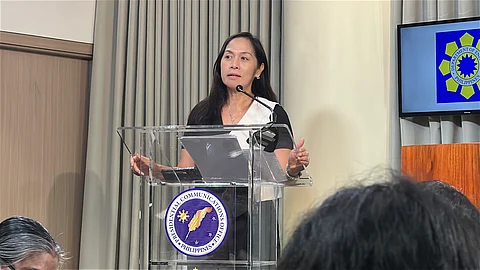
- NEWS
- the EDIT
- COMMENTARY
- BUSINESS
- LIFE
- SHOW
- ACTION
- GLOBAL GOALS
- SNAPS
- DYARYO TIRADA
- MORE

Amid growing calls to suspend value-added tax (VAT) and excise tax on petroleum products due to rising oil prices, the Department of Energy (DOE) said it cannot take such action without congressional approval.
DOE Officer-in-Charge Undersecretary Sharon Garin said the department is bound by existing laws, which only Congress can amend.
“The excise tax and the value-added tax, which is 12 percent, are imposed because of a law. That is legislation, so the DOE cannot go against what is mandated by law — nor the Department of Finance, nor even the President,” Garin said during a press briefing.
She clarified that while the DOE may suspend scheduled increases in excise tax, it cannot suspend or scrap existing fuel taxes altogether without new legislation.
“The only thing that is allowed is to suspend the increase, we are not increasing anything. But although, however willing the Cabinet would be, it's not allowed by law. So, it will have to be an act of Congress. An amendment to the current law is needed to either suspend, lower or even abolish taxes on fuel,” Garin explained.
Garin also underscored the importance of fuel taxes in public spending, noting that excise and VAT collections from petroleum products contribute around P300 billion annually to the national coffers.
“If we do away with the 300 billion, that’s also how many kilometers of roads, how many school buildings, health services, it will result in a reduction in the budget of the government. So, it’s a balance that’s the administration is trying to find: to protect the commuting public, but the basic service should also go on. So, that’s why the ayuda might be a good start for now."
The government, meanwhile, has committed to rolling out subsidies if global oil prices breach $80 per barrel, particularly in the event of worsening tensions in the Middle East.
Under current policy, once oil hits the $80 mark, the DOE will notify concerned agencies like the Department of Transportation (DOTr) and the Department of Agriculture (DA) to begin financial aid distribution.
Garin said the amount of financial aid would depend on the concerned agencies such as the Department of Transportation and the Department of Agriculture.
“There is no definite amount yet, the only definite is the P2.5 billion for subsidy for [Public Utility Vehicles]. But the individual distribution, on how much each recipient will receive, depends on who will receive and how many will benefit,” she said.
“Currently, DOE, DA and DOTr are meeting and DOTr is also hard-at-work determining the number of recipients, who will actually receive but I think DOTr already identified and now they're just finishing up the listing, I guess. But as pronounced by DOTr, they are ready to disburse anytime that the signal is given to them,” she added.
The DOE is also preparing for a worst-case scenario where oil supplies are disrupted and prices spike further. This includes exploring alternative supply routes and sourcing from other countries.
“There are options to do that. Right now, we have long-term options, but there are options also in finding other suppliers, finding other routes for our supply. But those things maybe earlier, the economic team has calmed down because they've seen that there's a lowering of the prices. So, we've been instructed to just prepare as usual, like if we're going to break the $80 limit,” Garin said.
